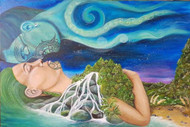Famous Māori Gods and Goddesses
Posted by Maris on 24th Oct 2023
Gods and goddesses are mythological characters in Aotearoa who significantly affect Mori culture. Although their names and tales differ, they share comparable gods to those listed above in Hawai'ian Polynesian myths. Instead of analyzing the same Polynesian gods and goddesses, we shall highlight the diversity of Polynesian subcultures. Let's get to know some of them!
Papatūānuku: The Earth Goddess

We arrive on Aotearoa's mainland North Island, and a regal goddess stands on a cliff, staring down at us in welcoming. She is Papa, the Earth's goddess, the land that gave birth to everything, and she watches after the children of trees, birds, animals, and mankind. She is frequently asleep, with her back to the sky, but she is here as a ghost to greet us.
She has many children that keep her engaged as the mother of all, yet she has been perpetually sorrowful since giving birth. Her first children separated her from her partner, Rangi, the sky deity. The children may have brought light to the earth, but they also made their parents sad by causing rivers and oceans to form as a reminder of their combined sorrow.
She is a woman who always appears unhappy, as if she longs to grasp her beloved as firmly as she did at the beginning of time.
Maori venerate Papa in a variety of ways, including birth and creation rites, because life derives from her body, the land. Women frequently have intimate relationships to the Earth because, like Papa, they can bring life to the earth. When a baby is born, the placenta and umbilical cord are buried at a sacred location. This location is transformed into tapu, a spiritually significant location.
Twhirimtea: Weather God

Papa reclines as a cloud casts a shadow on the ground. A storm is brewing.
Twhirimtea, the deity of the weather and son of Rangi and Papa, comes on a cloud riding a gigantic Polynesian god. He has the power of crashing clouds and thunder, and he's furious. He explodes in wrath every time he hears his mother's screams, enraged that his siblings were so selfish.
Twhirimtea's four siblings brought light into the world by separating Rangi from Papa; however, Twhirimtea was not pleased with this suggestion. So, in a fit of rage, he dispatched his children to express his disapproval. He hurled the four winds, rain clouds, and thunderstorms at each of his siblings. However, he did not defeat one, Tmatauenga, the god of battle and humanity, and his rage still causes severe weather.

Mori relies on this god because he influences the daily lives of farmers, fisherman, and other outdoor pursuits. For example, he is the person from whom everyone seeks favors if they want their crops to receive enough of rain during a difficult period or if a sailor requests calm winds.
Raumoko: Earthquake God

We hurry inland for protection from the roaring storm above, but it's just our luck; the Earth is groaning and an eruption is underway! Raumoko detects his brother's dissatisfaction, and being the god of earthquakes and volcanoes, he expresses his feelings through these natural phenomena.
During Papa's separation from Rangi, the four children turned their mother face-down so she wouldn't have to look at her partner's misery. Raumoko was cradled in her breast or womb, causing him to become stuck below, and his activities today create earth tremors and volcanic eruptions as he strives to escape.
Raumoko also has an impact on the changing of the seasons and his movements at different times of the year. Temperature shifts from warm to chilly air from subsurface lava vents produce transitions from Summer to Winter.
Despite Raumoko's ability to bring harm, Mori do not fear him. They recognize him as a compassionate god who will not hesitate to cause harm if he is not respected. Some tribes, however, see earthquakes and volcanic explosions as a sign that they have not been appeasing Raumoko. If they do not provide him with the necessary offerings, he may become frustrated and strike out.
Tāne Mahuta: The Forest God

The storm passes, the ground settles, and we find ourselves in the midst of a vast Tne forest, the domain of Tne Mahuta, the forest god. He is a tranquil Polynesian god who dresses his mother, Papa, in foliage after she was separated from Rangi. He accomplishes this with forest adornments ranging from tall sacred trees to little plants.
Mori refers to vast forests like this one as Tne, and he speaks to each tree as if they were his children. They greatly respect nature in all its forms, whether it is the mother or her son and his children in all of their green shapes. Respecting nature assures that nature will protect and respect animals and humans and provide them with the tools they need to survive.
When a tree falls, it is considered a sacred rite for the donated material. The bark of a tree, for example, is part of Tne's skin and has different meanings and spiritual importance. when a result, a Maori canoe carver undertakes particular procedures to guarantee that all gods in the forest are well respected when he carves the wood into a canoe.
Certain native trees are known by different names, and the older they were, the more important it was thought to be to protect them. Furthermore, particular wood species were set aside for specialized uses, such as a chief's dwelling or a waka.
Tne's progeny include trees and lesser plants such as flax. These are essential in Mori culture because they are used to weave strong fibrous materials into garments, bags, and ropes.
Tne waves us goodbye as we leave his jungle, climbing back into our waka and heading north towards the lesser Polynesian islands of Samoa and Tonga.

